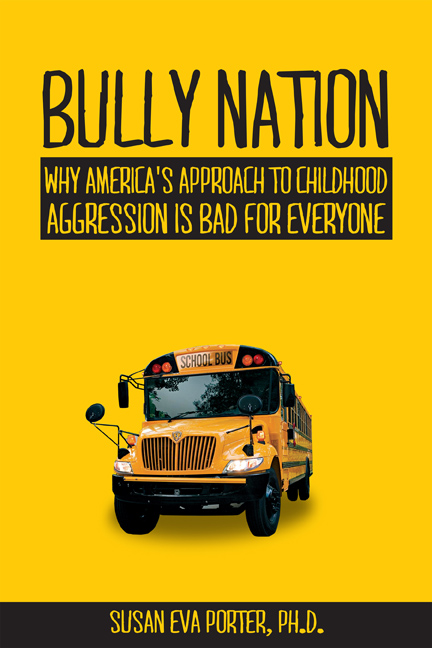Child development expert Porter (Relating to Adolescents: Educators in a Teenage World) convincingly turns the antibullying boom on its head by suggesting that the popular methods and language used in preventing childhood aggression are making things worse, despite good intentions. By labeling children as bullies, we malign them rather than help them grow; just as importantly, she points out, by labeling children as victims, we undermine their authority to control their lives and chip away at their resilience. Porter uses compelling research as well as useful, pointed anecdotes to demonstrate that the modern approach to this age-old problem is not the right one. In place of destructive bully language, Porter presents the GRIT approach: a Growth mindset, Responding versus Reacting, Interventions (and knowing when to intervene), and Teaching. Porter’s proposals require educators and parents to use their “adult brains” to recognize the complexity of children’s interactions and to respond accordingly. The final chapter includes helpful “essential questions” to coach adults as they guide children through challenging situations. While the GRIT approach may not be as easy as using standard bully language or a zero tolerance approach, Porter makes a clear case for why it is a better way forward for creating resilient children and healthier school climates. (Mar.)—Publishers Weekly
...a helpful corrective to programs and policies that emphasize a reactive approach to bullying. It is written in an accessible manner with lots of illustrations and stories demonstrating the author's points. It could be valuable for parents, administrators, teachers, and future teachers to read..
—Paul Neufeld Weaver, Department of Education, Bluffton University
...a contrarian view of the universal and timeless realities of childhood aggression, the damage adults do by overreacting to run- of-the-mill social tussles and micro-aggressions that are normal, and the deleterious impact of reducing admittedly painful playground conflicts into just three blanket categories: bully, victim, and bystander (the latter now instantly guilty by association or by inaction to intervene). Filled with scores of revealing case studies she has witnessed or counseled about herself as a child and school psychologist, Porter’s huge contribution is an attempt to reverse the dangerous trend she sees that oversimplifies, misreads, and overamplifies much of what is now called bullying, such as exclusion at the lunch table.... This book is must read for parents and educators.
—Patrick Bassett, President of the National Association of Independent Schools
“In fresh, frank terms, Sue Porter shows why our overheated approach to bullying is bad for everyone, and offers realistic, practical ways for schools and parents to cope.”
—Robert Evans, author of Family Matters: How School Can Cope with The Crisis in Childrearing
"Bully Nation is an absolute must-read for anyone wishing to understand why the anti-bullying movement is failing. The modern world has been intensively fighting bullying in schools for the past fourteen years, and all we have to show for our efforts is that bullying has become an epidemic. Susan Eva Porter possesses the clear vision to see what is wrong with this well-intentioned but counterproductive movement, and explains in sparkling clear terms why it is causing far more harm than good. This book is a major step in reversing this modern day witch-hunt against bullies and returning to a more rational and effective approach to reducing aggression among kids."
—Izzy Kalman, Nationally Certified School Psychologist and author of Bullies to Buddies: How to Turn your Enemies into Friends (Bullies2Buddies.com)
"When we advocate for laws against bullying, we declare the failure of psychology to solve the problem." "The most important book ever published on school bullying."—Psychology Today
America is obsessed with bullying. But is bullying a real problem? Bully Nation looks at the culture of fear created by the media, parents, educators, and the legal profession surrounding normal childhood aggression and examines how the conceptual frameworks, and specifically the language we use to describe social dynamics between children, simultaneously contribute to and limit our ability to deal with real problems among children when they arise.
Bully Nation contends that our approach to the issue is creating even more problems for us than it solves, and that in the long run it is harming our children. When we are quick to assign labels like “Bully” and “Victim” to a dynamic between children, we create static terms, and as a result we often inhibit childhood development in the name of keeping kids and schools safe. Bully Nation reviews normal childhood development, the role of aggression in a healthy childhood, and how children develop resilience.
Bully Nation explores how parents and educators fuel this cultural misfire—mostly unwittingly and with good intentions. In their desire to help children according to the prevailing wisdom, parents are often pitted against each other, and against schools, and as a result they lose each other as essential allies in the difficult task of raising children. The proverbial village is being torn apart as parents try to lick their children’s inevitable and predictable wounds.
Bully Nation presents an alternative schema for thinking about, discussing, and responding to childhood aggression beginning with a rethinking of the language around garden-variety meanness and the role of adults in engineering the social lives of children. Bullying is not always what it seems, and Bully Nation helps readers understand this essential truth. Case studies are presented throughout the book to illustrate points and deepen readers’ understanding of concepts.
Sue Porter's interview by Paul Harris on America Weekend.




